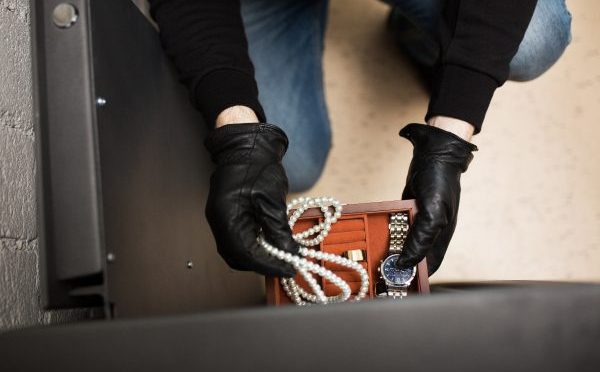In a criminal case, there is standard series of developments you can expect to take place. The first phase always starts with an arrest of some sort, whether as a result of a warrant or an actual physical apprehension. Continue reading to learn the rest of the 8 general steps of a criminal case.

Indianapolis Criminal Defense 317-636-7514
❶ Arrest
As mentioned, interest can take place in many forms. Most often, a defendant is arrested in person by a law enforcement officer; either because they were suspected of committing the crime at the time, or they were stopped for a routine offense and later found to have a warrant out for their arrest. Other times, a defendant is notified of a warrant and must surrender to authorities by being placed under arrest at the jail, and then continuing with the rest of the criminal justice process.
❷ Bail
After defendant is arrested, a presiding judge will decide whether or not they can be granted bail privileges. Most often, a defendant is provided the opportunity to post bail unless they are a repeat offender, or have a history of failing to appear for court hearings. Bail is set using the state’s bail schedule, which categorizes bail amounts in accordance with the severity of crime. There are several options a person can choose to obtain a release from jail through bail. They can pay the entire bail premium amount in cash (or collateral of some sort), and receive the money back when they complete all mandated court orders; or, they can hire a local bail bond agency and pay a nonrefundable fee that is only a mere percentage of their total bail premium. A defendant can also be released on their own recognizance, often referred to as being “OR’d” from jail. Under this circumstance, a defendant does not need to pay bail, but is still required to appear for all of their court hearings.
❸ Arraignment
A defendant’s first court appearance is called an arraignment. During an arraignment, a judge will read a defendant’s criminal charges, and then gives the defendant an opportunity to plead “guilty” or “not guilty” to those criminal charges. Sometimes, bail is also discussed. Also during an arraignment, future court hearings will be scheduled and arranged.
❹ Preliminary Hearing
Most often, the government brings criminal charges against a defendant in one of two ways. For minor to moderate charges, a bill of information is secured during a defendant’s preliminary hearing (also known as preliminary examination). For more serious charges, especially federal offenses, the government may use a grand jury indictment to bring criminal charges against the defendant. This is common with more serious offenses, such as white-collar crimes and murder. In fact, all federal offenses must be brought by a grand jury indictment. Both such hearings take place for the purpose of establishing the existence of probable cause. The prosecuting and defense attorneys will question witnesses and makes arguments at this time, but if probable cause is not found, the case will be dismissed entirely.
❺ Pre-Trial Motions
If probable cause is found, a defendant will be forced to stand trial. This starts at the pretrial motion, which is brought forth by both parties. During a pretrial motion, any issues remaining from the preliminary hearing or indictment will be resolved and finalized, and all evidence and testimony that will be admissible at trial is verified.
❻ Trial
Trial is one of the most important court hearings because it is the hearing in which the defendant learns if they are found guilty or not guilty for the criminal charges brought against them by the prosecution. At this particular hearing, the prosecution holds the burden of proving that the defendant is guilty of the criminal charges “beyond a reasonable doubt.” Once all arguments and witness testimonies are complete, the jury must come to a unanimous verdict that decides whether or not the defendant is guilty or innocent. If the jury cannot come to unanimous verdict, the presiding judge will declare the trial a mistrial. In this case, the trial is either dismissed or a new jury is chosen. If the defendant is found guilty, the court will then sentence them.
❼ Sentencing
The sentencing segment of a criminal case can take place separately from the trial, or at the same time as the trial. During sentencing, the judge will hand down the penalties for the criminal charges committed by the defendant. In order to determine the proper penalty for defendant, courts will consider various factors, including criminal history, mental health, personal circumstances, and even a defendant’s degree of remorse.
❽ Appeal
After a trial takes place, a defendant has the option of appealing their conviction. This takes place in appellate court, and usually a certified appellate attorney is hired for the job. However, defendants may also use their existing criminal defense attorney to file their appeal with a higher court.
Keep in mind that these basic stages can vary from case to case depending on a wide range of influential factors, including whether or not a defendant chooses to enter into a plea bargain. It is best to discuss your criminal defense with a licensed and trusted Indianapolis criminal defense attorney in your area in order to avoid the maximum penalties for your criminal charges.
How to Get Started on Your Defense

David E. Lewis Attorney at Law 317-636-7514
to schedule a free initial consultation and case evaluation. During this meeting, which is free of charge, you have the opportunity to sit down with Attorney David E. Lewis and discuss your Indiana criminal charges and the best strategies for your defense. Call as soon as today!














